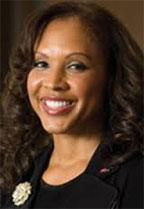 West Point correct not to punish fist-raising Black women
West Point correct not to punish fist-raising Black women
By Kim M. Keenan, George Curry Media Guest Columnist
I remember the first time I saw a Black raised fist. I was watching the 1968 Summer Olympics in Mexico City and two Black athletes, Tommie Smith and John Carlos, raised their black-gloved fists and bowed their heads on the medal ceremony stand during the playing of the “The Star Spangled Banner.” I was too young to know what it meant, but I was old enough to recognize the inherent personal power in their gesture.
Smith and Carlos, who were later inducted into the National Track and Field Hall of Fame, angered many Whites back home; they were vilified and were subjected to death threats.
In an HBO documentary years later, Smith said: “We were just human beings who saw a need to bring attention to the inequality in our country. I don’t like the idea of people looking at it as negative. There was nothing but a raised fist in the air and a bowed head, acknowledging the American flag – not symbolizing a hatred for it.”
Nearly a half of a century later, 16 Black female West Point cadets, posed in their traditional gray dress military uniforms, just weeks before their graduation. In the group photo, each raised a clenched fist, touching off another firestorm in the U.S.
Officials of the United States Military Academy in Annapolis, Md. opened an investigation on April 28 into whether the women violated Army rules that prohibit political activities while in uniform.
The firestorm that they ignited only highlights what it means to be a Black woman in an America that has no collective consciousness of what that means on a daily basis.
When Beyoncé and her dancers included a raised fist in her “Formation” performance during the Super Bowl this year, her usual spectacular performance was tinged with a bit of controversy.
At West Point, these young women are poised to lead us into a future where military leaders look like Black women and experience life as Black women, and where they are being vilified for a harmless photograph. This is not a photograph where they are scantily clad or displaying signs, flags, or symbols of disrespect to anyone. Each woman simply has her arms raised culminating in a fist. One wonders how West Point could even consider such an action a threat.
A more tangible threat is the paucity of African Americans at the military academy. West Point is 70 percent White, most of them males. The 16 cadets in the photo represent all but one of the Black women graduating on May 21 in a class of 1,000 – 1.7 percent.
Some critics charged that the women were participating in a Black Power gesture or aligning themselves with the Black Lives Matter. However, Mary Tobin, a 2003 graduate of West Point and an Iraq veteran who is a mentor to some of the seniors, told the New York Times: “These ladies weren’t raising their fist to say Black Panthers. They were raising it to say Beyoncé. For them it’s not a sign of allegiance to a movement, it’s a sign that means unity and pride and sisterhood. That fist to them meant you and your sisters did what only a few people, male or female, have ever done in this country.”
Even Black males who predated them at West Point were ostracized. Henry O. Flipper, who became the first Black graduate from West Point in 1877, endured four years in Annapolis without a fellow cadet ever speaking to him.
A half-century later, nothing had changed.
As Associated Press story noted, “Benjamin O. Davis Jr. entered West Point in 1932 as its only black cadet and spent the next four years shunned. He roomed alone, and no one befriended him. The future Tuskegee Airman and trailblazing Air Force general later said he was ‘an invisible man.’”
Are we really saying that the unspeakable slights and insults that Cadets Flipper and Benjamin O. Davis, Sr. endured are still the standard for the treatment of Black cadets at West Point? Or worse, perhaps the message to these young women is that they should endure and remain quiet, rather than express their feelings in this bastion of White maleness.
In fact, in 1976, the year before women were first admitted, male cadets described themselves as “the last class with balls,” according to the New York Times. Some seniors posed for a photo holding basketballs, footballs and baseballs yet were never threatened with punishment.
A voice keeps bubbling up in me and it just keeps saying, “I know how these Black women feel.” I know the feeling of climbing a mountain with everyone looking, watching, and perhaps waiting for me to fall. There is the feeling of having someone moving barriers in front of my path or misunderstanding that I want the same things that they want on the same terms.
West Point’s decision not to punish the women was the correct one. Their biggest sin was sharing their personal triumph over the Internet against the background of a military that until recently refused to allow them to serve in the same positions as men.
Kim M. Keenan is the President and CEO of the Multicultural Media and Telecommunications Council (MMTC). Prior to taking the helm at MMTC, Keenan served as General Counsel and Secretary of the NAACP. She is a past president of the National Bar Association and the District of Columbia Bar.
